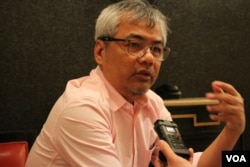Editor’s Note: The Documentation Center of Cambodia (DC-Cam), through its ‘Anlong Veng Peace Center’ project in the last stronghold of the Khmer Rouge, has produced two romantic songs to encapsulate the struggles of the region. The two songs, using romantic symbolism, highlight the challenges faced by the residents of Anlong Veng after it was integrated with the rest of Cambodia in 1998. VOA Khmer's Neou Vannarin recently interviewed the documentation center's executive director Youk Chhang by email about the release of the two new songs and recent events at the Anlong Veng Peace Center.
VOA: Can you tell our audiences more about the two songs produced by DC-Cam?
Youk Chhang: The songs center on two different, but similar, stories that represent love of country and the influence of community and national identity, history, politics and culture. Both songs center on a narrative that involves a man and a woman who are in love with each other.
The first song is the story of a man, who is a Khmer Rouge defector. He falls in love with a woman. The woman represents the country, Cambodia. In an act of commitment, the man gives up his weapons to be one with the woman. The woman, however, offers a promise of love, but no commitment. She becomes, in Cambodian culture, what would be symbolized as a cloud. Clouds are beautiful and entrancing, but they can quickly become foreboding and mark the beginning of rain, storms, and when mixed with earth turns into mud. The story symbolizes how Anlong Veng, the final stronghold of the Khmer Rouge, gave up its arms in a commitment to the country on behalf of a promise. In many ways, the song suggests the promise remains unfulfilled.
Anlong Veng in many ways has been encouraged to move on. The younger generations – particularly the youth who were born in Anlong Veng – do not understand the region’s importance in history and are confused when they hear about the references to the Khmer Rouge regime. The country has largely moved on from its Khmer Rouge history, and with this shift in national attention, the country’s commitment and attention to many Khmer Rouge areas have diluted and faded.
VOA: What is the second song about?
Youk Chhang: The intent of the [second] song, like the first song, is to capture the heart and soul of the people of Anlong Veng. The song is a message on how to interpret the country’s struggle with its history through the story of a man and a woman. The song is a story that speaks to how the country continues to seek answers for its difficult past and how competing views between the [ideas of] past and the future, rich and poor, traditional and modern can only be reconciled by mutual reconciliation and an earnest understanding of history.
Both songs are expressions of mankind’s imagination of what is and what can be, if only we have the commitment to be open-minded, kind, and committed.
VOA: How would these two songs heal wounds from the past? Why songs?
Youk Chhang: Songs are a medium for connecting philosophy, morality, and beauty. Like humanity, songs can represent all emotions and the contrasting conditions of good and evil, peace and violence, prosperity and poverty, and life and death. These songs are meant to speak to Cambodia’s struggle as a way to find reconciliation not only within itself, but also between her past and present. The songs are meant to both educate people about the country’s historical struggles and inspire them to break away from this past in different ways, so Cambodians, and particularly the Cambodian youth, can live better lives.
VOA: How can these two new songs be part of Cambodia's attempt to reconcile with the past?
Youk Chhang: Like all forms of art, these songs speak to the Cambodian soul in ways that no book or lecture could ever do. These songs inspire and educate us on what exists and what is possible.
VOA: How is Anlong Veng Peace Center?
Youk Chhang: The Anlong Veng Peace Center endorses and aligns with the vision of these songs. The Center educates the youth about the history of the country and the region, in order to build bridges between individuals, communities and the country. The Center is achieving its goals, one student, teacher, and community at a time. As Greek philosopher Plato stated, ‘Music is a moral law. It gives soul to the universe, wings to the mind, flight to the imagination, and charm and gaiety to life and to everything.’
I personally believe that music, like other media and art forms, are critical to the country’s history and future. It is only by leveraging all media and cultural forms that we can achieve the maximum potential of each individual, our community and the country.
This interview was edited for length and clarity.








